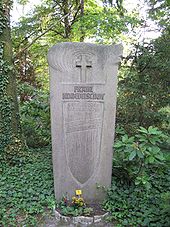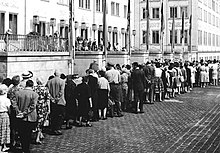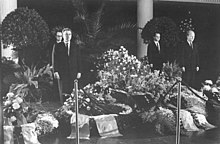Franz Konwitschny

Franz Konwitschny (born August 14, 1901 in Fulnek , Moravia , Austria-Hungary ; † July 28, 1962 in Belgrade , Yugoslavia ) was a German conductor .
Career
Konwitschny came from a family of musicians. From 1920 to 1923 he first took violin lessons at the Academy of the Musikverein in Brno , before becoming a student of Hans Bassermann (* 1888) at the Conservatory of Music in Leipzig from April 1923 to 1925 . The music pedagogue Fritz Reuter was one of his teachers there. During this time he worked as a temporary violinist and violist in the Gewandhaus Orchestra . In 1925 Konwitschny became a viola member of the Fitzner Quartet founded in Vienna in 1894 ; In 1927 he went to Stuttgart , initially as a répétiteur , and from 1930 as first conductor at the State Theater. At the beginning of the 1933/34 season he became musical director of the Freiburg Philharmonic Orchestra in Freiburg im Breisgau , where he was appointed general music director in 1934 . In 1938 he assumed the position musical director and musical director of the opera in Frankfurt am Main .
Career in the Nazi state
Konwitschny joined the NSDAP for the first time on July 1, 1923 in Fulnek (membership number 2,756). His political convictions at the time were also expressed in a Freiburg performance of Fidelio in 1934, where he wanted to bring SA men and SA flags on stage on the occasion of Hitler's birthday , but the management forbade this. On the other hand, in November of the same year he conducted the symphony Mathis der Maler by the ostracized composer Paul Hindemith in a subscription concert . On August 1, 1937, Konwitschny rejoined the NSDAP (No. 5 508.995). On October 16, 1937, Konwitschny conducted the German procession from Bruckner at the final rally of the 2nd Badischer Gau culture week, which had the motto “Race and Culture”, before Alfred Rosenberg's speech . In December 1942 Konwitschny was a guest conductor in the ghetto city of Łódź , whereby, according to the Litzmannstädter Zeitung of December 17, 1942, the “style of music carried by the greatest vitality” was fascinating.
He also worked at the State Opera in Hamburg and was chief conductor of the orchestra in Ludwigshafen , today's State Philharmonic of Rhineland-Palatinate , during the war years of 1943/44 .
Career in post-war Germany
Konwitschny continued his career after 1945 unscathed, in 1946 the city of Hanover appointed him as the musical head of opera and concerts (until 1949). From 1949 to 1962 he worked as the Gewandhaus Kapellmeister in Leipzig . At the same time he held the post of general music director of the Dresden State Opera from 1953 to 1955 and the post of general music director of the German State Opera in Berlin from 1955 to 1962 . In 1951 he was awarded the title of professor. In 1957 he received the Arthur Nikisch Prize . In 1951, 1956 and 1960 he was awarded the GDR National Prize. On August 14, 1961 he became an honorary member of the Gewandhaus Orchestra.
Franz Konwitschny died during a concert tour on July 28, 1962 in Belgrade. He was buried in an honorary grave in the Leipzig South Cemetery.
Konwitschny became particularly well-known as the conductor of the operas by Richard Wagner and concerts with works by Ludwig van Beethoven , Richard Strauss , Max Reger and Anton Bruckner .
His son Peter Konwitschny (* 1945) is a well-known opera director .
literature
- Bernd-Rainer Barth : Konwitschny, Franz . In: Who was who in the GDR? 5th edition. Volume 1. Ch. Links, Berlin 2010, ISBN 978-3-86153-561-4 .
Web links
- Works by and about Franz Konwitschny in the catalog of the German National Library
- Franz Konwitschny at Discogs (English)
Individual evidence
- ^ Dieter Härtwig: Fritz Reuter . In: Institute for Saxon History and Folklore (Ed.): Saxon Biography .
- ↑ Fitzner, Rudolf. In: Austrian Biographical Lexicon 1815–1950 (ÖBL). Volume 1, Verlag der Österreichischen Akademie der Wissenschaften, Vienna 1957, p. 326.
- ↑ Horst Seeger : Musiklexikon. People A-Z . First edition. German publishing house for music , Leipzig 1981.
- ↑ a b c d e Fred K. Prieberg : Handbook of German Musicians 1933–1945 ; CD-Rom-Lexikon, Kiel 2004; P. 3,882.
- ↑ ZDB -ID 1000519-5 .
- ^ Ernst Klee : The culture lexicon for the Third Reich. Who was what before and after 1945. S. Fischer, Frankfurt am Main 2007, ISBN 978-3-10-039326-5 , p. 329.
| personal data | |
|---|---|
| SURNAME | Konwitschny, Franz |
| BRIEF DESCRIPTION | German conductor and Gewandhaus Kapellmeister |
| DATE OF BIRTH | August 14, 1901 |
| PLACE OF BIRTH | Fulnek , North Moravia |
| DATE OF DEATH | July 28, 1962 |
| Place of death | Belgrade |


